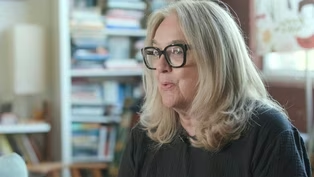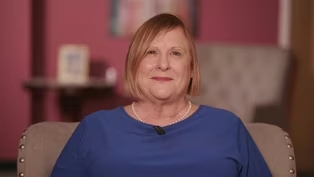
Sea of Stories
Clip: Season 4 Episode 7 | 10m 10sVideo has Closed Captions
Padma Venkatraman traveled the world as an oceanographer before becoming a novelist.
Author Padma Venkatraman has been writing works of fiction for young adult readers for more than a decade. Her novels transport readers to India, where she shines a light on marginalized communities. The Indian-American writer told Rhode Island PBS Weekly she didn’t see her life story reflected in the pages she read as a young girl and was determined to do something about it.
Problems playing video? | Closed Captioning Feedback
Problems playing video? | Closed Captioning Feedback
Rhode Island PBS Weekly is a local public television program presented by Ocean State Media

Sea of Stories
Clip: Season 4 Episode 7 | 10m 10sVideo has Closed Captions
Author Padma Venkatraman has been writing works of fiction for young adult readers for more than a decade. Her novels transport readers to India, where she shines a light on marginalized communities. The Indian-American writer told Rhode Island PBS Weekly she didn’t see her life story reflected in the pages she read as a young girl and was determined to do something about it.
Problems playing video? | Closed Captioning Feedback
How to Watch Rhode Island PBS Weekly
Rhode Island PBS Weekly is available to stream on pbs.org and the free PBS App, available on iPhone, Apple TV, Android TV, Android smartphones, Amazon Fire TV, Amazon Fire Tablet, Roku, Samsung Smart TV, and Vizio.
Providing Support for PBS.org
Learn Moreabout PBS online sponsorship- An adage that many authors subscribe to: write the book you want to read.
It's something that rings true for Rhode Island-based and Indian American writer Padma Venkatraman.
While Venkatraman long dreamed of becoming an author, she took a detour of sorts, sailing the seas as an oceanographer.
But as she told us when we first aired this story last October, writing was never far from her mind, and so was her desire to share what she describes as the sea of stories within her.
- I always wanted to write books that could be accessed by young people.
I don't know why, but maybe because they have this passion, and I think that we've messed up the world quite a bit, (laughing) and if anyone's going to fix them, it's going to be the young people.
(palms tapping) - [Michelle] Author Padma Venkatraman has been writing works of fiction for young adult readers for more than a decade.
Her five novels transport readers to India, where she shines a light on marginalized communities.
- For a little while, you know, you're in someone else's body because when the protagonist of a well-written novel is afraid, your heart is beating faster, right?
When the protagonist has something horrible happen to them, you are crying, and I think that for me is empathy and compassion, and those are the two highest things, I think, that a human being can achieve in their lives.
- [Michelle] Venkatraman says she learned those qualities growing up in India.
When she was eight years old, her parents separated.
It was an event that changed the course of her life.
- My mother went from being this very wealthy person, very wealthy woman, to being suddenly the person who had to work very hard to keep, you know, a house and home together.
- [Michelle] Venkatraman moved to the United States when she was 20 to attend graduate school.
It was an isolating experience for Venkatraman, who came to the States alone.
- I could not even speak to my mother more than six minutes once a month, okay.
So usually, it was three minutes once every two weeks.
That was all the time I had.
When your mom is halfway across the world, and she says, "Are you okay?"
You say yes because what else are you going to say, right?
- She's called Rhode Island home for more than 15 years.
Venkatraman lives in Narragansett, but her native India is never far from her mind.
Her most recent book, "Born Behind Bars," highlights the country's prison conditions.
I didn't read the author's note until the end.
- Yeah.
- And came to find out that this was, in fact, inspired by a true story.
Can you tell me about that story and how you came across it?
- I saw a BBC News report about this one child who had been born in jail in India.
Well, this woman whom they were talking about had been in jail for so long that she'd had this son in jail, and I thought that's shocking, and that's horrifying.
And when I saw the image of this little boy, he just became a character in my mind, and I saw this little kid, you know, sitting in this dirty, dingy jail cell.
- [Michelle] "Born Behind Bars" tells the story of a boy who's released from prison after spending his whole life there with his mom.
- Padma is the author of many wonderful books, such as "A Time to Dance," "Climbing the Stairs," and "The Bridge Home."
- [Michelle] Venkatraman recently received an award from the Boston Authors Club for the novel.
- I could hear his voice breaking through the bars on that jail cell and leaving through the gaps and reaching the sky and the stars because that boy could sing.
And they could imprison his body, but they could not imprison his mind.
They could not imprison his spirit.
- You gave a very impassioned speech that day at the ceremony.
- Yeah.
- Where does that emotion come from?
- So when I came to this country, I was not even legal drinking age.
I came alone.
I came by myself.
I did not have anybody for miles around that I knew, and I think going from there to being a citizen of this country, whenever, whenever I get an award, any kind of recognition that says, "We love your work, and we're glad that you are one of us," that is amazing to me.
(waves roaring) I love the ocean.
I grew up in a city near the ocean in India, and I feel really blessed and so lucky that I live in the Ocean State now.
- Venkatraman's love for the ocean brought her to the University of Rhode Island, where she taught oceanography and directed diversity efforts.
(waves roaring) Her career has taken her around the world, from serving as chief scientist on research cruises in Germany to working in laboratories in India.
Even though Venkatraman always wanted to be a writer, she says pursuing oceanography allowed her to be financially independent.
Was oceanography more of a safety net financially?
Is that why you chose to explore that?
- Yes, although it's an odd choice for a safety net, and I think part of the reason I did that was because it was also my passion.
I decided that I wanted to do something no one in my family had ever heard of.
I was a bit of a rebel.
And everybody said, "What is oceanography?"
in India, and my whole family thought I was a bit bonkers.
And you know, I kind of was, I guess, so I decided to do that.
- [Michelle] That rebellious streak, Venkatraman says, came from being bullied as a child after her parents separated.
- I felt like when I was a child, I had so much wealth, so much privilege, and then suddenly, to lose all of that as a child was something that impacted me in a very deep way.
- Venkatraman's books are geared for young adults, but that doesn't stop her from exploring some serious subjects.
For instance, her novel "The Bridge Home" chronicles the life of homeless children in India while touching on issues such as alcoholism and abuse.
What makes you think as you're writing this that these are topics that young adults want to read about?
- So for one thing, I think I experienced a lot of very traumatic things when I was young, and I think to be able to express that in an honest way, but not a graphic way, is important to me.
(wind whooshing) I could, yeah.
- [Michelle] As a young girl, Venkatraman says she never found a book that mirrored her own life.
When she moved to the United States, she fell in love with the country's public library system and feels grateful to see her work there.
- The fact that a book or something that you write can touch someone's life and change it, that's something I never, never get used to.
- She says being an Indian American author allows her to bring a unique voice to the world of young adult fiction.
It sounds to me like you are writing the books that you desperately wanted to read as a young girl.
- Yes, I definitely think that's true.
I also think I'm writing the books still that I want my daughter to be able to read or my daughter's generation to be able to read, and hopefully for years and years and years to come, you know?
- And one of the things she loves most about her work is connecting with readers.
What's the response you get from readers as you're traveling around the world, specifically in your native India?
What do readers say to you about how your work has affected them?
- I think seeing your story on the page can be very, very emotionally empowering, and I think a lot of children are empowered by that, and I know children who have been abused that then reached out to an adult and went to a safer place because they read "The Bridge Home," right.
That is, that's not even a gift.
That is beyond anything that you could even dream for or hope for, just that, the fact that you could touch someone else's life like that in a positive way, and that's what I.
Every time that happens, and that has happened, you know, many, many times, that's huge.
- Where do you see yourself five years from now?
- I hope I'll be writing books that will still, and in even greater numbers, empower young people, you know, empower them, bring those who are not safe into safer situations.
That would be where I hope I'd end up.
(ethereal inspirational music) (upbeat inspirational music) (upbeat inspirational music continues) (no audio) (no audio) (no audio) (no audio)
Video has Closed Captions
Clip: S4 Ep7 | 10m 31s | Local best-selling author, Ann Hood, recounts being a flight attendant in her new memoir. (10m 31s)
My Take: A Matchmaker on Finding Love
Video has Closed Captions
Clip: S4 Ep7 | 5m 32s | A professional matchmaker gives her unique take on how to find love. (5m 32s)
Providing Support for PBS.org
Learn Moreabout PBS online sponsorship
- News and Public Affairs

Top journalists deliver compelling original analysis of the hour's headlines.

- News and Public Affairs

FRONTLINE is investigative journalism that questions, explains and changes our world.












Support for PBS provided by:
Rhode Island PBS Weekly is a local public television program presented by Ocean State Media

